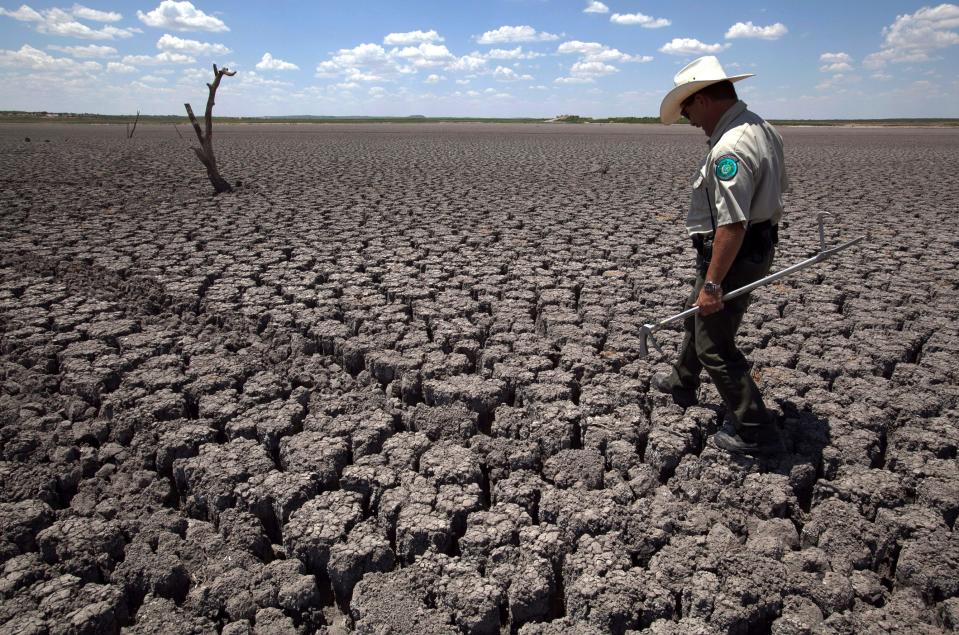The West's scorching heat and festering water crisis are part of new problem, study says
Cities scorching in 110 degree heat for days as water reserves dry up — that's life in the West now. But new research confirms the region hasn't always seen this devilish combination of extreme heat and blistering drought.
Scientists have reviewed 500 years of data to determine that the past 100 years have been both abnormally hot and dry — giving them new confidence that the droughts and record heat waves plaguing the region are fueled by climate change.
There's a term for what's going on: A “hot drought.” That means they now believe the region has been hit with heat and drought "unprecedented in frequency and severity" when compared to the past 500 years.
That's because climate of the West used to be noticeably different than the climate of today, primarily when it comes to temperature: "According to our estimates, the climate 500 years ago was generally, substantially cooler than at present, but not necessarily drier," said study lead author Karen King, an assistant professor in physical geography at the University of Tennessee in Knoxville. "The late 16th century, despite being cooler than modern times, was also characterized by megadrought conditions which rival those experienced today in terms of severity."
The new study, published in the journal Science Advances, shows that it's the combination of heat and drought that's unprecedented, not just the heat.
The findings add to growing evidence that human-caused warming from the burning of fossil fuels has exacerbated climate extremes across the region, and will continue to into the future, study authors said.
If global warming continues, "we can certainly expect the frequency and severity of summer hot droughts (compound warm and dry conditions) to increase over the next several decades," King told USA TODAY.
Heat, water crisis in West
The ongoing heat and drought in the West have recently reached crisis levels as the region deals with the impacts of the changing climate, from deadly record summer heat in Arizona to depleted reservoirs in Nevada. And while some winters – like last winter – can bring temporary relief, experts say occasional wet winters don't solve or delay the West's ongoing water crisis.
What is a 'hot drought?'
"Hot drought" is a colloquial term used to describe a drought, that by definition is caused by a lack of precipitation, King told USA TODAY. "However, it is made substantially worse by the influence of warmer-than-average temperatures. Another way to think about it is a 'temperature-exacerbated drought.'"
As droughts develop, they don't always require extreme heat, and can occur even during times of average or even below-average temperatures.
Using the current ongoing drought in the Southwest as an example, King said that precipitation deficits alone would qualify these modern conditions as drought conditions; however, the last 20+ years are also characterized by warmer-than-average temperatures, and these warming temperatures have actually increased the severity of the drought. Therefore, we can call this modern drought a "hot drought."

Tree rings measure past climate patterns
Scientists used tree rings from western U.S. forests to determine past temperature and precipitation amounts across the region.
This study encompasses the western states of the U.S. The majority of tree ring data from this study come from the Cascades, the Sierra Nevada, and the southern and central U.S. Rocky Mountain areas, she said.
What do others say about the study?
UCLA climate scientist Daniel Swain, who was not involved in the study, told USA TODAY the findings add to the body of evidence that the ongoing megadrought is due to human-caused activity. The climate of the West today "is very different than in previous centuries," he said.
Jonathan Overpeck, climate scientist and dean of the University of Michigan’s School for Environment and Sustainability, told CNN the implications are huge if climate change continues.
“Water security and wildfire will become bigger problems until climate change is stopped,” said Overpeck, who was not involved with the study but has done research on hot droughts. “These impacts were predicted long ago and are now becoming clear.”
This article originally appeared on USA TODAY: Water crisis in West: It wasn't always this hot, dry, study says

